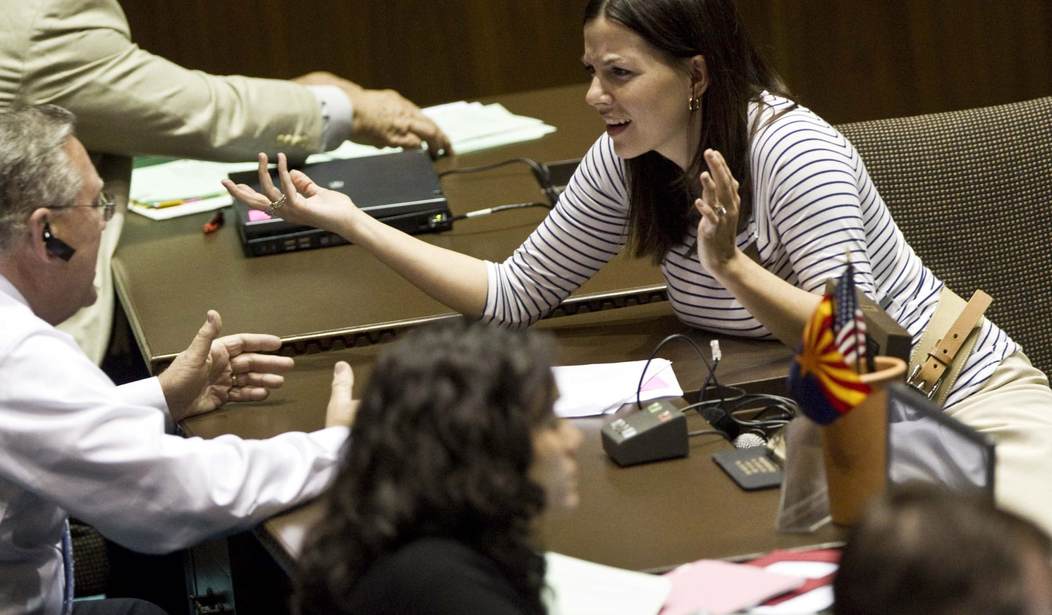Sexual harassment training has been ordered for every member of the Ohio Senate following the October resignation of Sen. Cliff Hite because of allegations the Republican asked a female state employee for hugs.
Hite admitted the “inappropriate behavior” in a statement posted on Twitter but maintained there was no “inappropriate physical contact,” beyond hugging the woman.
Cleveland.com discovered a state document that showed the unnamed woman said she had to reject Hite’s advances more than a dozen times over two months.
And just as allegations of sexual harassment have not been limited to Harvey Weinstein in Hollywood, Hite is not the only state legislative politician to be accused of acting “inappropriately” with a woman on the job.
Arizona
State Rep. Michelle Ugenti-Rita (R) said sexual harassment by her legislative colleagues has been a part of her day, every day, for the past six years.
“Almost immediately upon my arrival to the Capitol, I experienced unwanted sexual advances and lewd and suggestive comments regarding my body and appearance from male colleagues,” Ugenti-Rita wrote in a public letter that could be accessed through her Twitter account.
Although she never released the names of those who allegedly harassed her, Ugenti-Rita wrote that she “began to feel isolated and that I was being held to a different standard than the other members” after going public with her allegations.
California
More than 140 women — California Capitol staff, legislators, political consultants and lobbyists — signed a letter in October in which they said they suffered under a “pervasive” culture of sexual harassment.
“Each of us has endured, or witnessed or worked with women who have experienced some form of dehumanizing behavior by men with power in our workplaces,” the letter read in part.
One of the women who signed the letter, Pamela Lopez, a lobbyist, said a male legislator masturbated in front of her in a bar bathroom.
“I remember thinking, ‘Don’t scream or shout. I don’t want to cause a scene,’” Lopez told the Los Angeles Times. “‘Just look like nothing happened.’”
Illinois
While some of the women in legislative halls of power have declined to name the men they accused of sexual harassment, Denise Rotheimer, who works in Springfield as a lobbyist for victims of violent crimes, has named names.
She called out Democratic Sen. Ira Silverstein in front of a legislative committee, testifying that he had sent her hundreds of unwanted Facebook messages, called her at midnight, and made comments about her appearance.
Rotheimer, who is running for a spot in the Illinois House on the GOP ticket, also told lawmakers this wasn’t the first time she’d complained about Silverstein’s actions. Rothstein said no one paid her any attention for a year.
They’re listening now.
Senate President John Cullerton (D) said Silverstein “will no longer serve” as Senate Democratic majority caucus chairman.
Kansas
Women working in the Kansas Capitol are harassed every day because of the “good ol’ boy” environment in the state house, a former statehouse intern told the Kansas City Star.
“It’s a regular occurrence, hearing comments,” said the woman, who spoke on condition of anonymity because she continues to see legislators to advocate for bills. “It becomes normal after a while. As time goes by, you just kind of accept it.”
Abbie Hodgson, a former Kansas legislative staff member, told the Star she tried to get legislators to do something about the harassment.
“I was told to watch my back… I was told people were watching me,” she said.“I was told legislators are accountable to no one but the voters.”
Kentucky
A legislative aide to Kentucky Rep. Jeff Hoover (R) admits she exchanged suggestive texts with the House speaker. But the unnamed woman told the Courier-Journal that she only did it because a fellow legislative staffer told her it was essential to keep Hoover happy to get ahead.
But in at least one of the texts, Hoover told her that he could not come to see her: “You know I want to but I just can’t. I just can’t for either of us.” And in other texts, he expressed concerns that their relationship was inappropriate.
Re-evaluating the relationship after doing things like sending Hoover a photo of herself in a black lace G-string, the aide said she was a victim of sexual harassment.
The Courier-Journal reported the woman and Hoover had reached an out-of-court settlement, the terms of which were not disclosed.
Of course, this is only a partial list of sexual harassment complaints made against state legislative politicians. Charges of a similar nature have been claimed in Massachusetts, Oregon and the state of Washington.
Some women, such as Arizona Rep. Michelle Ugenti-Rita, protested harassment while it was happening. But many did not.
A paragraph from the letter signed by female politicians, lobbyists and Capitol staff in California’s Legislature provides insight into why many waited to raise their voices.
“Why didn’t we speak up? Sometimes out of fear. Sometimes out of shame,” it reads. “Often these men hold our professional fates in their hands. They are bosses, gatekeepers, and contacts. Our relationships with them are crucial to our personal success.”









Join the conversation as a VIP Member